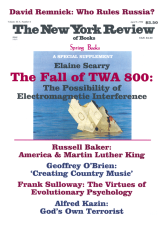In response to:
The Afterlife of Anne Frank from the February 19, 1998 issue
To the Editors:
Ian Buruma [“The Afterlife of Anne Frank,” NYR, February 19] seems to believe that quoting or paraphrasing Meyer Levin in my discussion of a book about him is equal to an endorsement or defense. He is mistaken. It is hardly as a follower or defender that I criticized Levin’s equation of the fate of his play with Holocaust victimization as “extravagant” and “outrageous.” My theme was misappropriation, and what I was concerned to defend against was what Mr. Buruma himself calls “vicarious identification.”
Further, Mr. Buruma is unaccountably offended by my characterization of Otto Frank, an assimilated, secular German Jew, as having a “deracinated temperament.” His response to this term is remarkably overreactive. “Deracinated” is a commonplace usage that is generally interchangeable with “assimilated”—a word Mr. Buruma finds less difficult—and connotes nothing more sinister than the loosening of inherited practices. This circumstance, I suggested, might serve to explain Frank’s well-documented decision to edit out of his daughter’s diary a mention of, for instance, Yom Kippur. Mr. Buruma is repelled by “deracinated,” he informs us, because it reminds him (and perhaps only him) that “accusing Jews of rootlessness is an old anti-Semitic ploy.” Precisely so. That Mr. Buruma should attempt, then, without foundation and against all the evidence, to connect my use of an ordinary descriptive phrase with repellently anti-Semitic purposes is as inexplicable as it is indecent.
Finally, Mr. Buruma’s silly presumption is that I think Otto Frank “should have been more Jewish.” I have no quarrel with anyone’s personal choices or affinities; it seems to me that commitment of any kind is normally allied with voluntarism, not with “should.” I am happy to add that I abhor so-called identity politics and its excursions into competitive victimization—an activity in which I decline to participate.
Cynthia Ozick
New Rochelle, New York
Ian Buruma replies:
If I were Meyer Levin (and still alive), I would feel rather let down by Cynthia Ozick. In her article (The New Yorker, October 6, 1997), she wrote about Levin’s “extravagant,” even “outrageous” behavior, but also about his “concern for uncompromised faithfulness.” She seems only to have read or seen one version of Levin’s play, which she describes as “moving, theatrical, actable, professional.” High praise in an article which accuses everyone else of falsifying, bowdlerizing, kitschifying, infantilizing, Americanizing, and sentimentalizing Anne Frank’s diary. She identifies Otto Frank as one of the falsifiers—along with Broadway hacks and dishonest translators. This leaves me with little doubt whose side she is on. If I am wrong, I can only say that Cynthia Ozick must be a monumentally woolly writer.
She also has a sloppy way with words. “Deracinated” is not the same as “assimilated.” The former means you have been uprooted, the latter that you have grown new roots. “Deracinated” is commonly used as a pejorative term. “Assimilated” is pejorative only to those who would see the two words as “interchangeable.” It is good to know, however, that Ms. Ozick is not such a person, since she abhors “so-called identity politics.” But if she thinks that blaming an act of falsification on the “deracinated temperament” of a Jew reminds only me of anti-Semitism, I wonder what company she keeps.
I was interested to read about Otto Frank’s “well-documented decision” to edit references to religious faith out of his daughter’s diary. Ms. Ozick said the same thing in her article. I don’t know what documents she is referring to, but in the one document that counts, the critical edition of the diary itself, there is no evidence that Otto Frank did anything of the kind. The original diary was edited by several people, beginning with Anne Frank herself. It was she who took out the reference to Yom Kippur, not her father. Otto took out passages about her sexuality and bitter remarks about her mother. There is mention of Chanuka, on Monday, December 7, 1942: “We didn’t make much fuss about Chanuka: we just gave each other a few trifles and then we had the candle.” The reference was left in.
Speaking of one falsification which has not been mentioned: in the latest version of the play, Mr. Dussel, the dentist, is made into an orthodox Jew. He was not.
This Issue
April 9, 1998



